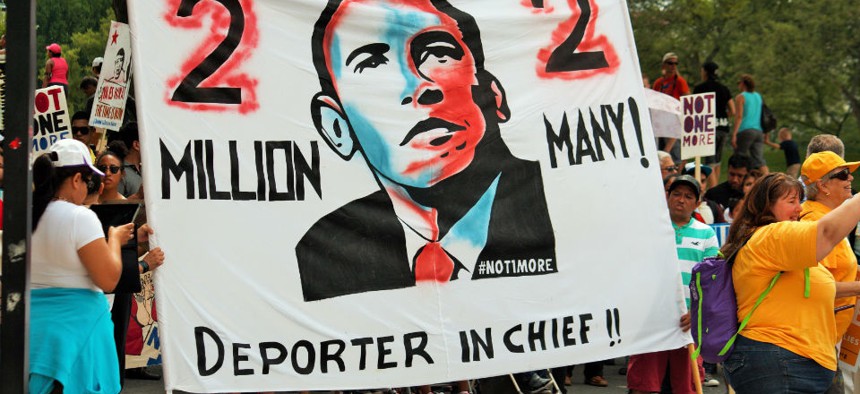
Protesters attend an anti-deportation rally in Washington in August. Flickr user marisseay
White House Swears Obama's Immigration Delay Is His Last One
Delay is intended to take the issue out of a "hyper-partisan, hyper-polarized" pre-election environment, spokesman says.
The White House is really serious this time: President Obama will act to legalize millions of undocumented immigrants before the end of the year.
Obama had promised to take executive action on immigration by the end of the summer, but on Saturday he announced that he would delay the move until after the November elections.
The delay was a pretty bald-faced political move that administration officials blamed on vulnerable Senate Democrats, who believed that a move to unilaterally legalize immigrants would embolden conservatives, scare off independents and cost the party control of the chamber in 2015.
So on Monday, White House press secretary Josh Earnest went to great lengths to emphasize that this delay would be the last, and that Obama really, truly would sign an executive order on immigration before the clocks strike midnight on Dec. 31.
"That is a decision that he has made, and that is something that will occur," Earnest said.
The president's commitment to asking on this before the end of the year has not changed."
Obama's move to postpone the executive action has more or less enraged everybody. Immigration reform advocates feel betrayed, while Republicans argue it is even more disingenuous for Obama to circumvent Congress after voters have had the chance to register their disapproval at the ballot box.
Earnest on Monday struggled to explain the decision in a way that didn't reek of politics.
Obama is not delaying the move merely to save a few endangered Democrats, Earnest argued, but to take the issue out of a "hyper-partisan, hyper-polarized" pre-election environment. To make the move now, he said, would "have a negative impact on the broader public support and the sustainability for immigration reform."
It's a curious argument, however, considering that Republicans have warned that an executive order by Obama would bury the chances for broad congressional action on immigration even deeper than they are now.
Neither party has come off looking good on immigration. Speaker John Boehner (R-Ohio), who has blocked a vote on legislation in the House for more than a year, was pilloried last week for suggesting that the issue could be revived in 2015 if only Obama changed his tune.
The biggest short-term risk for the president is that disappointed Hispanic voters will stay home in November.
Earnest candidly acknowledged the anger within the Democratic base and reform advocates, but he said Obama was "willing to take a little political heat" to ensure the sustainability of the issue.
(Image via Flickr user marisseay)






